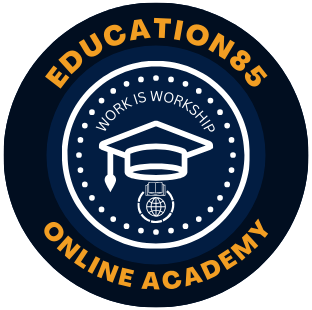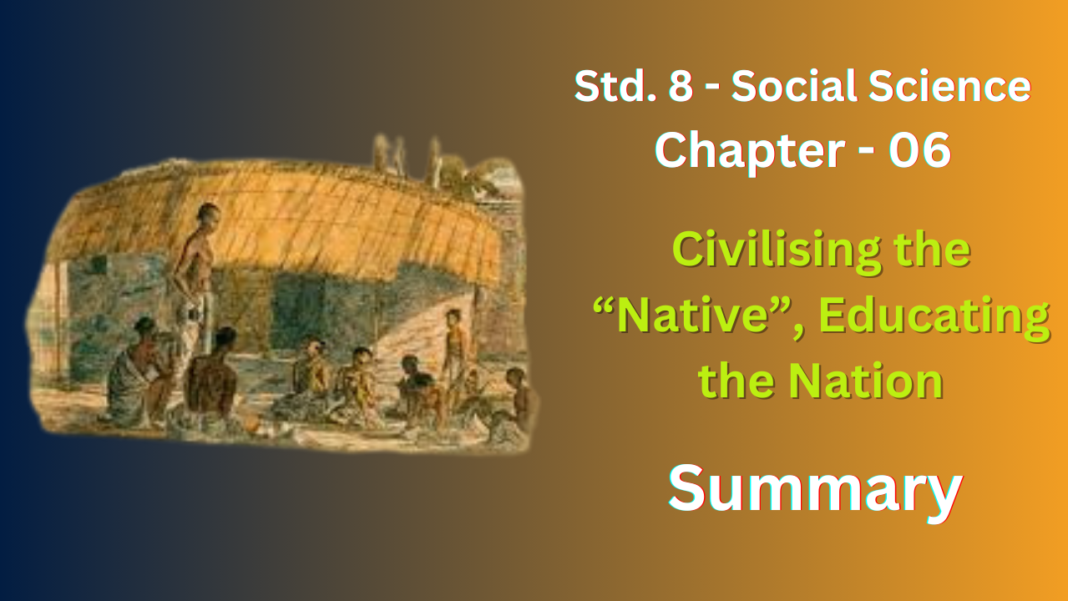NCERT Solutions for Class 8 History Chapter 6
The “Civilising the Native Educating the Nation” chapter explores how the British viewed education in India during their colonial rule. Here’s a quick summary:
British Views:
- “Civilizing Mission”: The British believed their education system would “civilize” Indians by introducing them to Western knowledge and values.
- Focus on English: They promoted English as the medium of instruction, aiming to create a class of Indians who could communicate and work within the British system.
Impacts:
- Two Systems: A divide emerged between a Westernized English-educated elite and the majority who received education in their local languages.
- Limited Access: Education for girls and lower castes remained neglected under the British system.
Debate on Education:
- Anglicists: This group favored widespread English education, believing it would modernize India. (e.g., Thomas Macaulay)
- Orientalists: This group argued for the importance of preserving and promoting Indian languages and culture in education. (e.g., William Jones)
Indian Responses:
- Support for Vernacular Education: Many Indians, like Mahatma Gandhi, criticized the neglect of local languages and advocated for education in the languages people understood best.
- Nationalist Movement: Education also became a tool for promoting nationalism. Indians established schools and colleges that emphasized Indian history, culture, and identity.
NCERT Solutions for Class 8 History Chapter 6
Exercise
1. Match the following:
| Column I | Column II |
| William Jones | Promotion of English education |
| Rabindranath Tagore | Respect for ancient cultures |
| Thomas Macaulay | Gurus |
| Mahatma Ghandi | Learning in a natural environment |
| Pathshalas | Critical of English education |
Ans :
| Column I | Column II |
| William Jones | Respect for ancient cultures |
| Rabindranath Tagore | Learning in a natural environment |
| Thomas Macaulay | Promotion of English education |
| Pathshalas | Gurus |
| Mahatma Gandhi | Critical of English education |
2. State whether true or false
- James Mill was a severe critic of the Orientalists.
- The 1854 Despatch on education was in favour of English being introduced as a medium of higher education in India.
- Mahatma Gandhi thought that the promotion of literacy was the most important aim of education.
- Rabindranath Tagore felt that children ought to be subjected to strict discipline.
Ans :
- True: James Mill was a harsh critic of the Orientalists who focused on the study of classical Indian languages and literature. He believed this approach ignored the potential benefits of Western education and knowledge.
- True: The 1854 Wood’s Despatch, also known as the Magna Carta of English Education in India, emphasized the use of English as the medium of instruction in higher education. While it also advocated for vernacular languages in primary schools, English became the key to access higher education opportunities.
- False: Mahatma Gandhi, while recognizing the importance of literacy, believed education should encompass more than just reading and writing. He advocated for a holistic education that included vocational skills, self-reliance, and moral development.
- False: Rabindranath Tagore, a proponent of progressive education, criticized rigid discipline and rote learning methods. He envisioned schools that fostered creativity, independent thinking, and connection with nature.
3. Why did William Jones feel the need to study Indian history, philosophy and law?
Ans : William Jones’ interest in studying Indian history, philosophy, and law stemmed from a combination of factors:
- Respect for Ancient Cultures: Jones held a deep respect for ancient cultures, both Western and Eastern. He believed India had a rich and glorious past worth exploring and understanding.
- Unlocking Knowledge: By studying ancient Indian texts in their original languages (Sanskrit), Jones hoped to unlock valuable knowledge in philosophy, law, and history that could contribute to a broader understanding of human civilization.
- Bridging the Gap: He envisioned studying Indian knowledge systems as a way to bridge the cultural gap between the British and Indians.
- Education for Indians: Perhaps, Jones also saw the potential for this knowledge to be used in educating Indians about their own heritage, fostering a sense of pride and cultural identity.
4. Why did James Mill and Thomas Macaulay think that European education was essential in India?
Ans : James Mill and Thomas Macaulay, key figures in British India, both believed European education was essential for several reasons:
- “Civilizing Mission”: They saw it as a way to “civilize” Indians by introducing them to Western knowledge, values, and thought processes. This aligned with the broader colonial ideology of cultural superiority.
- Modernization: They believed European education would modernize India, promoting scientific thinking, rationality, and administrative efficiency, making it easier to govern the colony.
- Creating an Anglicized Elite: They envisioned a class of Indians educated in English who could communicate effectively with the British administration and act as intermediaries.
5. Why did Mahatma Gandhi want to teach children handicrafts?
Ans : Mahatma Gandhi believed in educating children beyond just reading and writing. Here’s why he emphasized teaching handicrafts:
- Practical Skills: Gandhi valued practical skills like weaving, carpentry, or pottery. He felt these skills would empower individuals and make them self-reliant.
- Dignity of Labor: He wanted to break down social hierarchies that looked down on manual labor. By learning crafts, children would appreciate the dignity of all work.
- Self-Sufficiency: Gandhi envisioned a self-sufficient India, less reliant on imported goods. Handicrafts production would contribute to local economies.
- National Identity: He believed reviving traditional crafts could strengthen India’s cultural identity and sense of self-worth.
6. Why did Mahatma Gandhi think that English education had enslaved Indians?
Ans : Mahatma Gandhi criticized the English education system in India for several reasons, believing it “enslaved” Indians:
- Cultural Disconnect: The focus on English language and Western knowledge systems distanced Indians from their own culture, traditions, and languages. This created a sense of inferiority and a disconnect from their roots.
- Lack of Practical Skills: The education system neglected practical skills needed for daily life and self-reliance. It produced individuals better suited for clerical jobs than contributing to India’s economic development.
- Colonial Mindset: Education in English fostered a mentality of admiration for British values and administration. Gandhi believed this hindered the development of a spirit of independence and self-government.
- Limited Access: The English education system primarily benefited a privileged few, creating a social divide between those who could access it and the vast majority who couldn’t.
7. Find out from your grandparents about what they studied in school.
Ans :
- Urdu/Hindi language
- Mathematics
- Social study, Drawing.
8. Find out about the history of your school or any other school in the area you live.
Ans :
St. Peter’s Academy: A Legacy of Excellence
St. Peter’s Academy holds a place of pride in my community, standing as the oldest educational institution in the region. Founded in 1980 by a Christian missionary, the school boasts a rich history filled with academic achievements and milestones.
The Academy prioritizes strong leadership, with a principal known for their academic excellence and administrative skills, appointed by the missionary. This commitment to quality extends to the teaching staff, who are all highly talented and dedicated to student success.
With a vibrant student body of over 5,000, St. Peter’s Academy fosters a stimulating learning environment. Students consistently achieve outstanding results in their board exams, bringing not only honor to themselves but also to the wider community. It’s no wonder I feel a strong sense of belonging and pride in being a student at St. Peter’s Academy.
NCERT Solutions for Class 8 History Chapter 6
FAQ’s
What were the objectives of colonial education policies discussed in NCERT Solutions for Class 8 History Chapter 6?
Colonial education policies aimed to propagate Western ideals, languages, and culture, civilize the native population, and produce a class of Indians who would assist in the administration and perpetuation of British rule.
How did colonial education impact Indian society according to NCERT Solutions for Class 8 History Chapter 6?
Colonial education led to the spread of Western ideas and values, the decline of traditional education systems, the emergence of a new educated elite, and social stratification based on Western education and employment opportunities.
What were the different forms of education introduced by the British as per NCERT Solutions for Class 8 History Chapter 6?
The British introduced various forms of education, including English-medium schools, vernacular schools, universities, and vocational training institutions, each catering to different sections of society and serving different colonial objectives.
How did education contribute to the emergence of Indian nationalism discussed in NCERT Solutions for Class 8 History Chapter 6?
Education provided Indians with exposure to Western ideas of liberty, equality, and nationalism, facilitated the spread of anti-colonial sentiments, and nurtured a sense of pride in Indian culture and heritage, laying the foundation for the Indian nationalist movement.
How did colonial education impact gender dynamics in Indian society according to NCERT Solutions for Class 8 History Chapter 6?
Colonial education initially focused on educating elite boys but gradually expanded to include girls, albeit with limited access and emphasis on domestic roles. Nonetheless, education provided some women with opportunities for social mobility and participation in nationalist movements.
What role did Indian reformers and educators play in shaping colonial education policies as discussed in NCERT Solutions for Class 8 History Chapter 6?
Indian reformers and educators advocated for vernacular education, cultural revival, and the promotion of indigenous knowledge alongside Western education, challenging colonial stereotypes and fostering national pride and identity.
How does NCERT Solutions for Class 8 History Chapter 6 contribute to understanding the complexities of colonial education and its legacy in India?
NCERT Solutions for Class 8 History Chapter 6 provides insights into the multifaceted nature of colonial education, its impact on Indian society and nationalism, and the ongoing challenges and debates surrounding education in India today.
What were some key reforms and initiatives in Indian education post-independence mentioned in NCERT Solutions for Class 8 History Chapter 6?
Post-independence, India undertook educational reforms aimed at universalizing primary education, promoting regional languages, expanding vocational training, and addressing disparities in access and quality of education.









